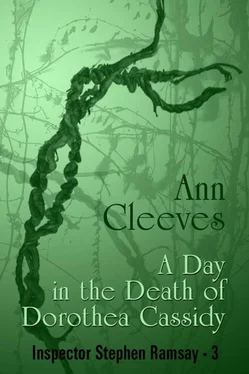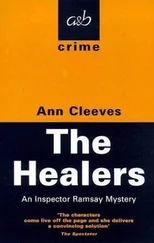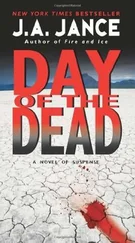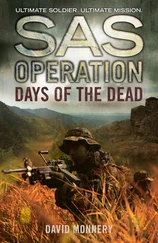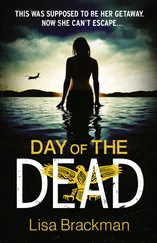Ann Cleeves - A Day in the Death of Dorothea Cassidy
Здесь есть возможность читать онлайн «Ann Cleeves - A Day in the Death of Dorothea Cassidy» весь текст электронной книги совершенно бесплатно (целиком полную версию без сокращений). В некоторых случаях можно слушать аудио, скачать через торрент в формате fb2 и присутствует краткое содержание. Жанр: Детектив, на английском языке. Описание произведения, (предисловие) а так же отзывы посетителей доступны на портале библиотеки ЛибКат.
- Название:A Day in the Death of Dorothea Cassidy
- Автор:
- Жанр:
- Год:неизвестен
- ISBN:нет данных
- Рейтинг книги:5 / 5. Голосов: 1
-
Избранное:Добавить в избранное
- Отзывы:
-
Ваша оценка:
- 100
- 1
- 2
- 3
- 4
- 5
A Day in the Death of Dorothea Cassidy: краткое содержание, описание и аннотация
Предлагаем к чтению аннотацию, описание, краткое содержание или предисловие (зависит от того, что написал сам автор книги «A Day in the Death of Dorothea Cassidy»). Если вы не нашли необходимую информацию о книге — напишите в комментариях, мы постараемся отыскать её.
A Day in the Death of Dorothea Cassidy — читать онлайн бесплатно полную книгу (весь текст) целиком
Ниже представлен текст книги, разбитый по страницам. Система сохранения места последней прочитанной страницы, позволяет с удобством читать онлайн бесплатно книгу «A Day in the Death of Dorothea Cassidy», без необходимости каждый раз заново искать на чём Вы остановились. Поставьте закладку, и сможете в любой момент перейти на страницу, на которой закончили чтение.
Интервал:
Закладка:
Theresa stared blankly ahead of her and he could not tell if she had understood him. The three of them sat in silence, watching the dust in the sunlight, waiting for the footsteps on the pavement which would mean that Joss Corkhill was on his way home.
Chapter Ten
In the bus from Armstrong Street to the Ridgeway Clive Stringer stared at Walter Tanner and grinned. They got off the bus at the same stop and Clive hurried home. He saw the old man again, a little later, when he went to fetch chips for himself and his mother. Tanner was standing outside the row of shops at the centre of the estate. He waited until Clive had bought the chips and disappeared back up the road before he made his move.
Walter Tanner had started coming to the betting shop on the Ridgeway Estate when his mother was still alive. He had chosen the Ridgeway because it was unlikely that he would meet any of his acquaintances there and in those days, before he had gambled away all the family money, he had owned a car. His mother was one of those women who became elderly in middle age and who suffered from persistent and undefined illnesses. When Walter’s father was alive there was some controlling her. She accepted his authority with resentment but not hostility and saw it as her duty to prepare him meals and help him occasionally in the shop. But Walter’s father had died in late middle age and then she became almost permanently an invalid. She left her room in the evenings to watch television, which she enjoyed, but took no active part in the household. Walter found himself hating her and hating himself because he could find no compassion for her. He took his religion seriously.
At first the trips to the betting shop were weekly. Inside, in the hot and smoky little room he felt anonymous. He could take any risk he liked and no one would know. Then he became recognised as a regular, one of the gang, and he found a warmth and friendship he had never experienced in church. As a single man in church he was isolated, exceptional. The place seemed full of happy families or gaggles of elderly ladies. He felt more an employee of the congregation than a participating member. There was no social contact. The bookmaker’s was full of single men, and they accepted Walter without question. He was terribly unlucky and they loved him for it. No matter how much they lost they could console themselves that Walter had lost more. When occasionally he did win they were honestly pleased for him. They clapped him on the shoulder, told him his luck must be about to change. He felt that the weekly trips to the Ridgeway kept him sane. Without them he would have murdered his mother. Soon once a week was not enough and his savings began to disappear.
His mother died without his assistance on the weekend after he had had to sell the car. He felt surprisingly little emotion, not even relief, when he came home from the Ridgeway to find her cold and stiff in her bed. She still had the complaining, slightly petulant look on her face which was as much a part of her as the mole on her cheek and her watery brown eyes. He began automatically to wonder which horse he would back in the three fifteen at Newmarket.
After his mother’s death he tried to keep away from the betting shop for a while. He told himself that now he had no reason to escape. But he was wrong. There were other pressures. He cared about the shop and wanted to maintain it in its old glory but it was expensive to run and his regular customers grew older and less willing to spend money. Soon he was in debt. More disturbingly Dorothea Cassidy turned up at the vicarage and began to question his authority in the only place he had ever had any power. Eventually he sold the business and then, even with the gambling, he had a little financial security. But Dorothea Cassidy remained less easy to deal with.
When Dorothea’s car was found on his drive the instinct to escape to the betting shop was irresistible. He felt that in the accepting, unquestioning atmosphere of the shop he would find the strength to sort himself out and decide what to do. After a few bets he would relax again. But when he pushed open the door and waved his usual greeting to Susan behind the counter he found they were all talking about the murder.
‘Here’s Wally,’ one of the punters said. ‘He’ll know what’s going on. Tell us about it, Wally.’
In comparison to them he was well educated and seemed to have a limitless supply of money. They trusted his judgement. They gathered around him wanting information and it was almost the same elated sensation as after a win.
‘Well,’ he said, diffident, in case they should think he was boasting. ‘Actually her car was found on my drive.’
Then he was the most popular person in the place. Was there blood, they wanted to know, any clues? Had the police given him a bad time? Perhaps he could sell the story to the papers and make a fortune.
On Abbey Meadow the fair was still. Men cleared up the mess of the night before. They called to each other, using nicknames and the technical terms of their trade which would have been incomprehensible to outsiders. Joss Corkhill walked among them, an Alsatian as big as a wolf by his side, shouting greetings, feeling immensely at home. He told himself the fair was the only place he had ever belonged. It was his Irish blood, he thought. He needed to travel. He regarded each of the rides with affection. He passed the waltzers where the night before teenage couples had clung to each other, shrieking with mock-terror above the music, and the galloping horses and the old-fashioned helter-skelter with its wooden slide and woven rope mats. His mate’s ride was called the Noah’s Ark. Carved animals spun at great speed around an undulating track. There was nothing heavy to do. Most of the work was in setting up the fair and clearing it away at the end, but Joss was occupied all morning in cleaning and general maintenance and when they packed up at dinnertime his friend gave him ten pounds.
As he worked Joss tried to decide what to do about Theresa. He wanted her with him. It was a matter of pride. He had thought he had persuaded her and then the bloody social worker and the bloody vicar’s wife had got in the way. Yet as he walked around the wooden animals, he smiled to himself.
‘You’re in a good mood today,’ his mate said. Usually, before he had had a few drinks, Joss was bad-tempered, taciturn, inclined to lash out. Once, after a court appearance for being drunk and disorderly, a well-meaning magistrate had asked for a social inquiry report to get to the root of his drinking and his violent mood swings. The probation officer had sent him to a psychiatrist, but the doctor had failed to come up with a convenient label. Corkhill had a personality disorder, he said, and they could do nothing to treat that. So he had been fined and sent away to continue drinking.
Rumours of the murder across the river came early but were not specific. By the time the police came to Abbey Meadow with their photographs and their suspicion of everyone who worked on the fair, Joss Corkhill had left the site and was spending his wages in one of the pubs in the town, his Alsatian under the bench at his feet. He drank quickly and heavily but he did not stay long. He wanted to talk to Theresa. It was time, he thought, for a showdown.
The streets in the centre of town were busy with Friday shoppers and visitors. Joss Corkhill pushed his way through them and walked quickly out of the town towards the Ridgeway Estate, stopping on the way at a small off licence to buy a bottle of cider. At the corner of the street where Theresa lived he paused. There was a smart car he did not recognise outside. It was probably the social worker’s boss, he thought. That was all he needed. Another bloody woman. So he took a drink from the bottle and went back to the bookmaker’s thinking that he would wait until the visitor had gone.
Читать дальшеИнтервал:
Закладка:
Похожие книги на «A Day in the Death of Dorothea Cassidy»
Представляем Вашему вниманию похожие книги на «A Day in the Death of Dorothea Cassidy» списком для выбора. Мы отобрали схожую по названию и смыслу литературу в надежде предоставить читателям больше вариантов отыскать новые, интересные, ещё непрочитанные произведения.
Обсуждение, отзывы о книге «A Day in the Death of Dorothea Cassidy» и просто собственные мнения читателей. Оставьте ваши комментарии, напишите, что Вы думаете о произведении, его смысле или главных героях. Укажите что конкретно понравилось, а что нет, и почему Вы так считаете.
